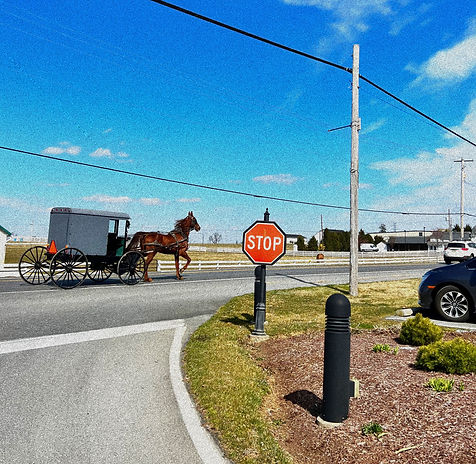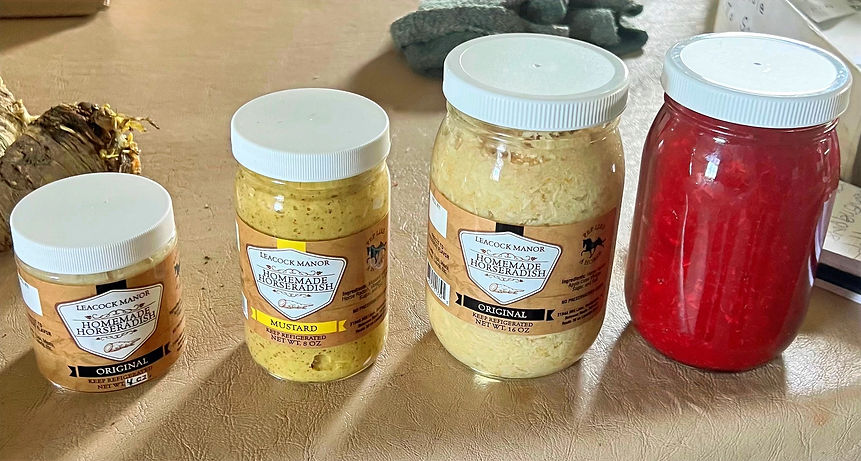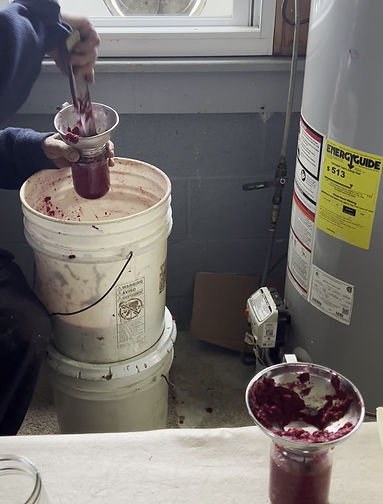
An Amish Business Maven
Father to nine, grandfather to 51, and great-grandfather to three, Samuel Stoltzfuz, is a simple, unassuming man.
However, no matter how simple he may appear, this quiet, deeply religious man, soon reveals he is anything but.
“Are you Christian? Oh, bless your heart!” he exclaims, before revealing the secrets to how a man, with no highschool diploma, can become a successful, respected member of the Lancaster County community.
He is Amish, (Old Order Amish, to be exact.)
This means that he does not have a phone line in his home, does not permit his family to use computers, (although he makes exceptions for business, and general typing purposes,) has never operated a vehicle, dresses in modest black clothing, and worships God in a German dialect, known as Pennsylvania Dutch.
According to Elizabethtown College sociology professor, Dr. Donald Kraybill, the unique language of the Amish is a vestige of their immigrant ancestors, who "arrived [on American shores] in the 18th and 19th century.... And spoke a German dialect. As they adapted to life in Pennsylvania, their dialect took on new features and became known as Pennsylvania Dutch, or Pennsylvania German."
Today it is spoken by the plain dressing Amish and Mennonites, whose written language is English.
One may think occupational choices for a man with this type of lifestyle would be minimal. Perhaps, agricultural, at most.
However, for Stoltzfuz, and approximately ⅔ of his Lancaster County Amish cohorts, running businesses is the primary source of income.
Yes, businesses.
Plural.
Walking in to his wooden work enclave, Sam says he is preparing a case of about “30 bottles of horseradish," for a customer in New York.
“I have three different kinds of horseradish. Original, spicy, and beet. They come in two different sizes. Regular and large. I have been making my own horseradish for over 40 years, ever since my wife, Katie, discovered the root growing all over our property,” he says.
And, like so many other Lancaster County Amish businesses, he has few employees, and all are Amish.
This specific business has one employee: himself. And, sometimes, “my wife, if she’s not busy with other things.”
This is not an uncommon trend, amongst Amish business owners, according to Kraybill.
He states that it is easier to employ Amish workers, as there is no guessing game, in terms of what work expectations are. The Amish know how they like things done, and are “most comfortable amongst each other," where they know their methods of operating will be respected, and followed.
For example, according to Kraybill, Amish businesses "do not operate on Sundays." That is something that many "customers grow frustrated with, as deliveries, etc. may be scheduled to arrive on a Sunday."
But, for the Amish, not conducting business on a Sunday is an absolute certitude. Something an Amish employee knows is a nonnegotiable.
The fact that employing numerous employees requires more paperwork, and bureaucratic red tape, is another reason the Amish try to keep their businesses as uncomplicated, and discreet, as possible.
Stoltzfuz describes his horseradish business, specifically, as more of a passion project, than anything else.
He says he is lucky if he breaks even.
“I found a [more contemporary Amish] man in town, who put my horseradish online. Hopefully, that will make this business more fruitful,” he continues.
Kraybill explains that "neighbors, oftentimes, create websites, for their Amish friends, but they themselves do not control the website, or, usually, own the computer. Many Amish business owners are now utilizing the internet, to expand their businesses, and increase their customer base."
"It is important to remember that different Amish communities, across the country, do
things differently, and abide by different rules. But, the older generation has really
embraced technology, because they know how important it is to business. They will even
let their younger children help them navigate the internet," he continues.
Upon looking online, there are no ads for Irish Towne Horseradish.
Subsequently, after being asked how he gets most of his customers, he replied, “Oh, signs outside. But, mostly through word of mouth.”
That is how he drums business.
Stoltzfuzs’ stream of income does not stop with horseradish. He is, also, something of an amateur journalist and author.
“These are my files. I typed all about my family history, the history of our property, and our customs. I have a book a publisher published a few years back, too, called "What It’s Like to Be Amish", even though it didn’t come out as good as I hoped. Wanna buy a copy?”, he asks, not turning down a valuable opportunity to make a buck.
Interestingly, he later shares that he writes articles for local Amish publications. He does not share the names of these newspapers.
Stoltzfuz, then, explains that he had a shed building business for many years, but “being north of 60, I decided to stop. It was hard work.”
When pressed for his actual age, he reveals he’s north of 60, by a mere 20 years.
Stoltzfuz, later, begins to open up a bit more, about his extensive family, referring to them as his “blessings.”
And, like any proud father, he begins to enthusiastically boast about his daughter Linda, a young businesswoman herself.
“Linda has a dog breeding business. You can find her online, on Greenfield puppies. She has four puppies left of the latest litter. One is still for sale, if you’re looking,” he happily exclaims.
Unlike her father, Linda says that she “does use a computer. But, only at work.” And, as for who photographs the dogs, and arranges for their veterinary visits, a non-Amish “middle-man” takes care of all that.
“We find non-Amish helpers through our other friends who own businesses. They recommend local people, and then we’ll call, and chat with them,” Stoltzfuz says.
“And, when we need a car ride, we call the one (local) with the phone,” he laughs.
It is important to note that it is particularly common for women to be in charge of the grander-scale business, some Amish people own.
According to Dr. Kraybill, "Business ventures among the community are quite gendered. Women are more into quilt making, greenhouses, and food products, while men are more into mechanical things, like welding, construction, and machinery. A woman, will, usually, not even get involved with any entrepreneurial efforts until her children have grown a bit, because rearing them with a strong, Christian background, takes precedence over everything."
"But, overall, when an Amish woman runs a business, it is, usually, smaller in scale, to that of a man," he continues.
Now, if you thought this man and his close-knit family’s entrepreneurial pursuits ended here, you would be sorely mistaken.
When Stoltzfuz is not caught up with other things, he does inventory for a local funeral home.
Of course, by hand.
The massive scrolls of deceased community members’ names pile up on his enormous, wooden work table, located in one of his many attics.
Additionally, he will sometimes assist his wife in sewing large quilts - something Sam refers to as “comfort tops.” They do use sewing machines, but they are powered by homemade, diesel generators, (Sam’s horseradish work-area is hydraulic powered.) Some of the quilts are sold, but the past year, a number have been donated to the Ukrainian relief effort.
“Any money we can get towards helping those suffering in Europe, is greatly appreciated and always welcome,” Stoltzfuz urgently expresses. His compassion for others is palpable, and a quality attributed to his close-held Christian values.
Continuing sightseeing on Stoltzfuzs’ sprawling, green property, workshops are visible at every turn.
Connected to his house, off his house, down the pathway from his house; wherever you go, remnants of labor follow.
Intertwined among the gorgeous milk-towers, horses, and modest ladies’ smiles are carpentry workshops, grinding rooms, farm land, dog kennels, harvest areas, sheds, and countless other sects.
Kraybill shares that some Amish people are disturbed by the growing commerciality of
Lancaster, among both the town itself, and its people. Especially, over the last "20 or so years."
The land here is, truly, encompassed by all things work-related. It permeates every aspect of Amish life, and is a virtue of their religion.
According to Kraybill, “The Amish have extraordinary work ethic. From the time they are children, their socialization skills are far and above that of many adults. They are taught to interact with customers, manage their family shops, and run a home, as soon as they are deemed capable.”
Kraybill partially attributes this level of maturity, among Amish youth to them being “put to work” so young, with no technological distractions, such as smartphones, and video games.
An old Amish proverb states, “the man who rows the boat, seldom has time to rock it.”
Clearly, this bit of philosophical wisdom is still being put to work.

A horse leading an Amish man down the road, alongside the passing of cars.

Samples of Stoltzfuzs' homemade horseradishes, in a variety of sizes.
